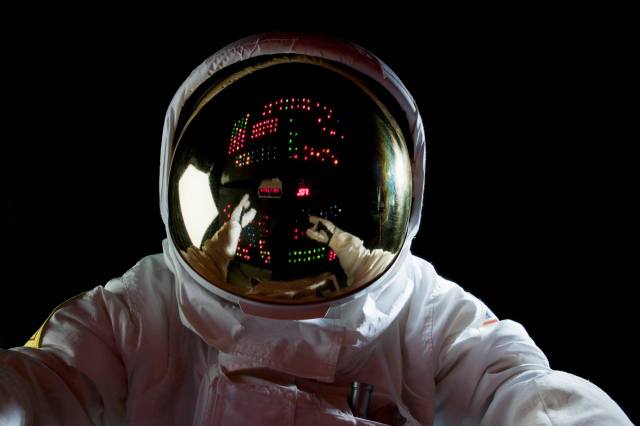Credit: Getty

Next year, marks half a century since mankind walked upon another world. This year, marks an equally important anniversary. On the 21 December 1968, the crew of Apollo 8 – Frank Borman, Jim Lovell and William Anders – blasted off from the Kennedy Space Center en route for the Moon. Though they didn’t land, they did become the first human beings to see the whole of the Earth, to witness an Earthrise and to venture beyond Earth’s orbit.
However, they weren’t the first Earthlings to go extraterrestrial – that honour belongs not to mankind, but to tortoise-kind. On 18 September 1968, two tortoises, some flies and various other creepy-crawlies were launched into space aboard the Soviet Union’s Zond 5 mission – the first spacecraft to circle the moon and come back home again.
If life has evolved nowhere else in the universe, then that means the history of extraterrestrial life is a mere 50 years old – beginning with a couple of commie tortoises and their invertebrate fellow travellers.
But how likely is it that life is unique to Earth? Not very, one might think. The universe is a big place – and one in which planets not unlike our own are thick as blackberries.
We don’t know how life first arose. We’ve yet to replicate the process in a laboratory. Yet, it must be possible, otherwise we wouldn’t be here. We also have evidence, albeit patchy, that the evolution of intelligence is possible. So, given the mind-boggling number of opportunities for it to happen elsewhere, it would seem exceedingly unlikely that we’re alone.
But how do we calculate the odds? In a fascinating piece for Vox, Liv Boeree writes about the main statistical tool at our disposal – the Drake Equation:
“In 1961, astronomer Frank Drake proposed a formula that multiplied seven ‘parameters’ together to estimate N, the number of detectable civilizations we should expect within our galaxy at a given moment in time.”
Even if you put in some very low figures for parameters like the fraction of planets that develop life, the chance of that life getting civilised, and the proportion of civilisations that send signals into space, the fact that key multipliers – like the number of planets – are so high should mean a universe positively cluttered with evidence of alien life.
Yet when we looked, we found nothing:
“In 1950, while working at Los Alamos National Laboratory, physicist Enrico Fermi famously exclaimed to his colleagues over lunch: ‘Where is everybody?’
“He had been pondering the surprising lack of evidence of other life outside of our planet. In a universe that had been around for some 14 billion years, and in that time developed more than a billion trillion stars, Fermi reasoned there simply must be other intelligent civilizations out there.”
Now, 68 years later, and despite numerous advances in astronomy and spaceflight, we’ve still got nothing.
Hence the Fermi Paradox – which juxtaposes what the Drake Equation would suggest is out there and the continuing lack of evidence that anything is.
Is the Drake Equation misleading us?
“…the Drake equation is ultimately vulnerable to the optimism or pessimism of whoever wields it. And this is reflected in previous scientific papers whose results give values of N ranging anywhere from 10 to many billions.
“As astronomer and SETI co-founder Jill Tarter eloquently put it in an interview with National Geographic in 2000: ‘The Drake Equation is a wonderful way to organize our ignorance.’”
Boeree writes about a recent update to the equation. This uses ‘Bayesian logic’ – a statistical method for revising estimated probabilities on the basis of subsequent observations. Along with another statistical tweak, the researchers used the Bayesian update to recalculate the probabilities:
“This two-stage process produced striking results: Based upon the current state of astrobiological knowledge, there’s a 53 to 99.6 percent chance we are the only civilization in this galaxy and a 39 to 85 percent chance we are the only one in the observable universe.”
Of course, this revised method is itself a “wonderful way to organise our ignorance” – albeit in a more sophisticated manner.
Nevertheless, the underlying Bayesian principle is a sound one – the longer and harder we look for evidence without finding it, the greater the likelihood that intelligent alien life is either freakishly rare or that we’re alone in the universe.
In my view, proof of humanity’s unique status would be of infinitely greater importance than the discovery an alien civilisation. Indeed, it would be the most important scientific discovery ever made – one demanding an explanation that a lot of people wouldn’t like.
Still, at least they could comfort themselves with the thought that a tortoise won the space race. Aesop would be proud.










Join the discussion
Join like minded readers that support our journalism by becoming a paid subscriber
To join the discussion in the comments, become a paid subscriber.
Join like minded readers that support our journalism, read unlimited articles and enjoy other subscriber-only benefits.
Subscribe